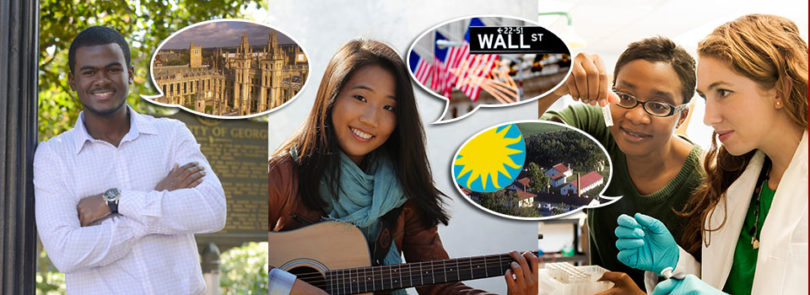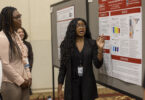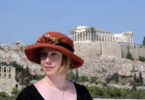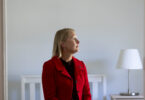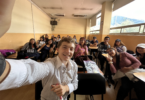Founded in 1972 by the trustees of The University of Georgia Foundation, the Foundation Fellowship is UGA’s premier undergraduate scholarship. It offers a stipend that approximates the cost of attendance, a post-first-year Maymester study abroad program at Oxford University, individual travel-study grants, spring group travel-study, research and academic conference grants, dinner seminars with some of the university’s most prominent faculty, and a mentoring plan that matches Fellows with professors who share their interests.
Beyond the obvious scholastic benefits, the Fellows program emphasizes fellowship, sharing of resources and ideas, and lifelong friendships. Peer mentoring, dinner seminars and book discussions, cultural events, group travel, the Fellows Library in Moore College, and twice-a-year off-campus retreats promote a sense of community among the Fellows.
In this feature, three Foundation Fellows describe the extraordinary opportunities that the Foundation Fellowship has provided them.
Camir Ricketts is a senior from Montego Bay, Jamaica, majoring in microbiology:
For me, the Foundation Fellowship is a complete departure from what I expected my undergraduate years would be. There are no words that can convey just how impactful and beneficial this community has been to me, an international student from Jamaica.
As I complete my final semester here at the University of Georgia, I can look back and fully appreciate the experiences that the Foundation Fellowship has afforded me. Not in my wildest dreams did I envision myself visiting Argentina and Uruguay, or studying at the University of Oxford. Through the Fellowship, I have been able to partake in travel and also in various research opportunities that have prepared me for the next step in reaching my career goals. Never did I think that I would have been surrounded by a community as vibrant and as welcoming as this one, filled with people who have encouraged and supported me every step of the way. The Foundation Fellowship has been and will continue to be one of the greatest support groups anyone could ask for, with administrators who care and do everything in their power to help you succeed.
If I had to make a highlight reel of my time being a part of the Foundation Fellowship, the clips would show a stark bias to spending three months studying at the University of Oxford. It was a unique blend of academic and social endeavors that took me from studying in the world-renowned Bodleian Library to hiking with friends along the coast of Cornwall. There were days when I devoted hours to writing a paper about recurring themes in James Joyce’s Ulysses, and others I spent exploring the streets of London, getting lost in Cambridge, or touring Roman Bath. Punting down the Cherwell River made reading about British society during the seventeenth century much more enjoyable. I played cricket with the Keble College team and made some great friends along the way.
The Foundation Fellowship is far more than just a scholarship, and this becomes more evident with each passing day. I have learned so much from other students within this community who have very different interests and goals from my own. From book discussions guided by deep-thinking individuals to lunchbox lectures from well-respected professors, this community fully satisfies my mental appetite.
Krystal Lo is a second-year student from Marietta majoring in economics:
For me, the Foundation Fellowship is a unique community of dynamic and energetic individuals who strive to improve on issues that are of importance in today’s society. Nowhere else would I have an already established network to show me the ropes and push me to excel beyond my expectations.
During my first year at the University of Georgia, I had the chance to work with older Fellows who helped me grow and learn exponentially as we took on the PwC Tax Challenge. As a result, I gained insight into the design and presentation of a solid business case worthy of first place. That same year, my class of Fellows traveled to New York City for spring break, where we met several alumni working on Wall Street. There I met Bethany McCain (’13), who is currently a financial analyst for J.P. Morgan. Bethany, along with economics professor Dr. Julio Garin, helped me connect with the Central Bank of Uruguay, where I will be interning this coming summer. Other alumni such as Jesse Chan (’14) and Camille Gregory (’13), who work at McKinsey & Company as management consultants, are always open to answering any questions I might have and providing helpful advice regarding career paths and personal development.
I am currently enrolled in a Markets and Enterprises course offered by the Honors Program in association with the Corsair Society, an Honors-sponsored organization that prepares students for careers in financial services and management consulting. Speakers include CEOs of leading private and public companies, senior leadership at top investment banks on Wall Street, management of leading hedge funds and private equity firms, and senior leadership at top management consulting firms. This course allows me to explore my interest in how to propel the efficiency and effectiveness of modern day enterprises as well as gain a further understanding of the business world and develop relationships with individuals knowledgeable in their respective areas of the financial sector.
The Foundation Fellowship provides the groundwork and resources for motivated students to pursue and excel in careers of any field. From book discussions and dinner seminars, to resume assistance and alumni mentorship, together the UGA Honors Program and Foundation Fellowship have enabled me to pursue my various interests and set myself up for success in whichever path I choose.
Torre Lavelle is a third-year student from Macon majoring in ecology, political ecology and environmental economics:
For me, the Foundation Fellowship is a strong yet diverse community, and a constant source of support and inspiration. Snippets of our conversations range from fond memories of our various travel experiences to excitement over new research developments in the labs we’ve been working in here on the University of Georgia campus. Undergraduate research opportunities were what drew me to the Fellowship in the first place, and they have remained a strong focal point of my time here.
During my second year at UGA, I was able to pursue research on anthelmintic resistance through the Center for Undergraduate Research Opportunities or CURO, via a partnership between the Odum School of Ecology and the College of Veterinary Medicine. Although parasitic worms are not the most savory of subjects to research, the ability of helminths to survive drug treatment at the recommended dosage rate is a critical hazard in the management of infectious diseases, particularly in South Africa. Dr. Vanessa Ezenwa, my research mentor, played an invaluable role that went far beyond the usual job description, a common depiction when Fellows talk about their faculty mentors-UGA professors value undergraduate research in a manner that I have found to be unparalleled at any other institution.
Dr. Ezenwa encouraged me to pursue an internship this past summer at the Smithsonian Conservation Biology Institute (SCBI) in Virginia. In June, I watched as the Smithsonian board of directors, research scientists, center heads, and chief veterinarian entered into a key tiger conservation partnership with thirteen countries and affirmed a vision for transnational support. For the next nine weeks as an intern for SCBI, I worked with Dr. Bill McShea, Smithsonian National Zoo Senior Scientist, translating this integrative conservation approach into regional deer, carnivore, and invasive plant species surveys that incorporated public participation, educational outreach, and economic analysis.
Travel-study and academic conference grants from the Fellowship have been invaluable in allowing me to delve into my academic interests undeterred. From presenting my research to other students at the Clinton Global Initiative University Conference to spending part of my summer in Fiji, where I studied human-environment interaction and participated in a homestay in the coastal village of Waitabu, my adventures have always begun with a simple phrase of support from Fellowship administrators: “What’s next?”


